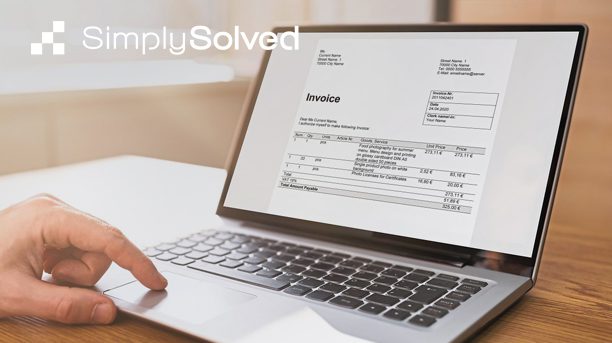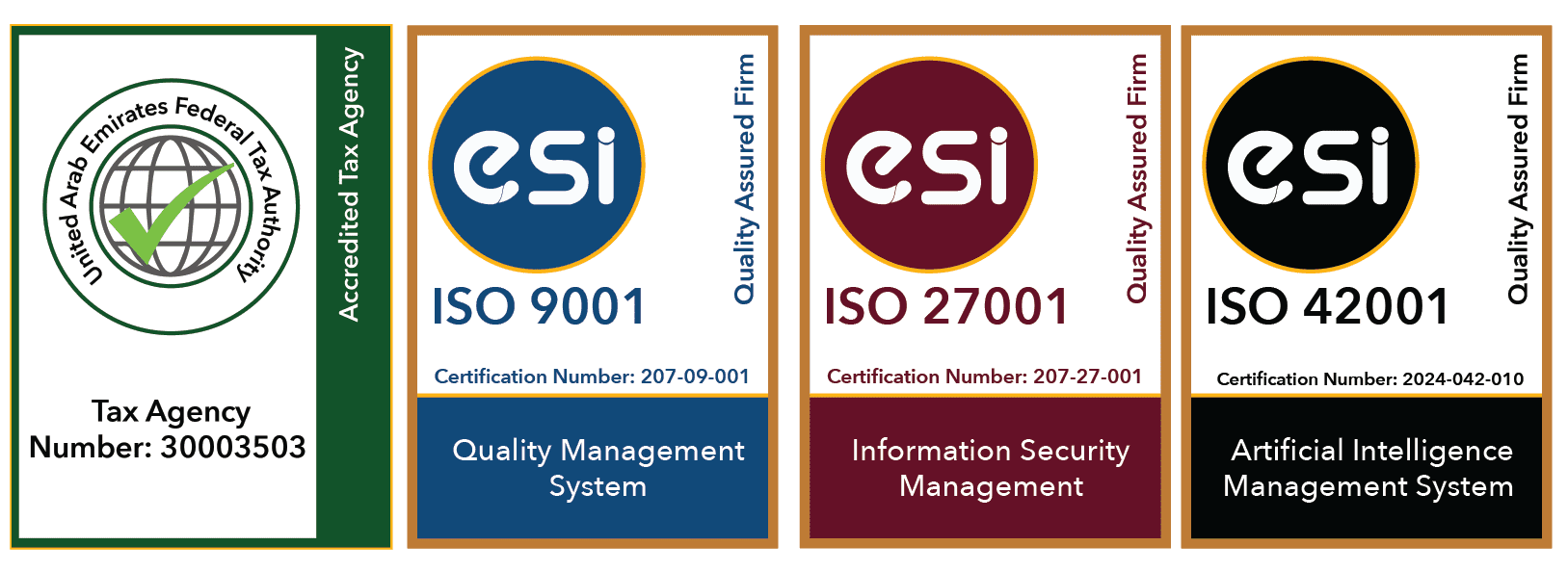Introduction of E-Invoicing: Legal Framework, Timeline, and Business Implications
14 April, 2025 / Haroon Juma / E-Invoicing

The Federal Tax Authority has announced a planned introduction of the e-invoicing system as part of its strategy to enhance tax compliance, promote transparency and modernize the tax system. Phase 1 of the e-invoicing initiative is planned introduction is targeted to go live in Q2 2026 and will redefine the nature of financial transactions in the UAE.
This article provides an overview of the UAE’s e-invoicing system, legal foundation, implementation roadmap, and the impact on businesses. We also highlight what steps companies should take now to prepare for this mandatory shift.
What is E-Invoicing?
Electronic invoicing (e-invoicing) is the systemised process of generating, transmitting, receiving, and storing invoices in a structured digital format. It will replace traditional paper-based or PDF-based invoices with machine-readable data that is automatically processed.
The UAE’s e-invoicing system will standardize the format of VAT Tax invoices to ensure invoice data is reported to the FTA in real-time or near-real-time. Under the Making Tax Digital initiative, it is part of a broader global trend seen in countries such as Saudi Arabia, India, and many EU member states.
Legal Foundation of E-Invoicing in the UAE
UAE’s e-invoicing mandate originates from Federal Decree-Law No. 16 of 2024, which amends provisions of the original VAT Law (Federal Decree-Law No. 8 of 2017). The amendment introduces definitions related to:
- Electronic invoice
- Electronic credit note
- Electronic invoicing system
These changes allow the FTA to prescribe rules, formats, and standards for issuing and receiving invoices electronically.
Cabinet Decision No. 91 of 2023 further supports the implementation by laying the foundation on how the e-invoicing infrastructure will function. The FTA also launched an e-invoicing consultation paper in 2024 to engage stakeholders and collect feedback.
E-Invoicing Model: Decentralized Continuous Transaction Control (DCTCE)
The UAE has adopted a Decentralized Continuous Transaction Control and Exchange (DCTCE) model based on the PEPPOL (Pan-European Public Procurement OnLine) standard. This five-corner model ensures interoperability between systems.
Key Stakeholders in the E-Invoicing Flow:
- Supplier (Issuer): Generates and sends the invoice.
- Supplier’s Accredited Service Provider (ASP): Validates the invoice format and sends it to the buyer’s ASP and/or FTA.
- FTA: Receives and stores invoice data for tax compliance purposes.
- Buyer’s ASP: Forwards the validated invoice to the buyer.
- Buyer (Recipient): Receives the e-invoice via the platform.
To ensure secure and accurate reporting, only FTA-approved ASPs will be permitted to participate in the process. The list of accredited ASPs is expected to be published by the FTA.
UAE E-Invoicing Implementation Timeline
The FTA has announced a phased approach for the rollout of e-invoicing in the UAE subject to further changes. The MoF plans to develop the e-invoicing data dictionary by Q4 2024 and release the relevant e-invoicing legislation by Q2 2025.
|
Timeline |
Milestone |
|
Q4 2024 |
Accreditation procedures for e-invoicing service providers |
|
Q1–Q2 2025 |
Final legislation and technical specifications issued |
|
Q3 2025 |
Pilot testing and early onboarding for large taxpayers |
|
Q2 2026 |
Phase 1 go-live (large businesses and VAT-registered entities) |
|
2027 and beyond |
Expansion to B2C transactions and smaller businesses |
This phased implementation ensures that all companies, regardless of size, have sufficient time to prepare their systems and processes.
Who Will Be Affected?
The e-invoicing regulations will affect all VAT-registered businesses in the UAE, with initial implementation focusing on:
- Business-to-Business (B2B)
- Business-to-Government (B2G)
The system may extend to Business-to-Consumer (B2C) transactions, especially in industries such as retail, F&B, and e-commerce.
Foreign businesses supplying goods or services within the UAE may also be affected if they are required to register for VAT.
How E-Invoicing Will Affect UAE Businesses
- Increased Compliance Requirements
Businesses will be compelled to comply with specific e-invoicing formats, validation rules, and real-time reporting obligations. This will necessitate integration with ASPs, either through APIs or plug-in software.
- Investment in Technology
Companies using legacy systems or manual invoicing methods will need to invest in upgrades including ERP upgrades, automation tools, and employee training.
- Reduced Tax Evasion and Fraud
By mandating real-time data sharing with the FTA, the government aims to reduce tax evasion, fictitious invoicing, and fraudulent refund claims, thereby improving the overall tax environment.
- Penalties for Non-Compliance
The FTA is expected to enforce strict compliance through monetary fines and potential legal consequences for entities that fail to meet e-invoicing obligations.
Preparation Steps for UAE Businesses
It is essential for businesses to prepare for e-invoicing in the UAE.
- Assess Current Systems: Determine if your ERP or accounting software can support e-invoicing and integration with ASPs. Certain software providers will undertake the necessary technical support and your business may not be affected.
- Identify an ASP: Stay updated on the FTA’s list of approved service providers.
- Ensure Data Accuracy: Clean up your customer and supplier master data to avoid mismatches during validation.
- Train Finance and IT Teams: Build internal knowledge on e-invoicing standards, formats (like XML or UBL), and compliance workflows.
- Follow Regulatory Updates: Regularly check the FTA website for updates on technical specifications, legislation, and deadlines.
The UAE’s introduction of mandatory e-invoicing is a significant step in digital tax administration.
Businesses that plan and act early will benefit from smoother implementation, cost savings, and enhanced compliance. As the UAE aligns itself with global digital taxation trends, e-invoicing is a mandatory compliance requirement.
Frequently Asked Questions (FAQ)
- Is e-invoicing mandatory in the UAE?
Yes, e-invoicing will become mandatory starting from Q2 2026, with phased adoption based on business size.
- Who needs to comply with e-invoicing?
All VAT-registered businesses, particularly those involved in B2B and B2G transactions, must comply.
- What format will e-invoices follow?
The invoices must be structured using formats like XML/UBL, validated via FTA-accredited ASPs.
- Will there be penalties for non-compliance?
Yes, the FTA will introduce penalties for failure to implement e-invoicing, although details will be clarified closer to implementation.
How SimplySolved Can Help
Optimising your tax compliance and model can be challenging. SimplySolved provides comprehensive solutions to help your business succeed:
- Corporate Tax Registration: We ensure your business is properly registered and compliant with the Federal Tax Authority (FTA) requirements.
- Tax Planning & Compliance: Our experts help you optimize your tax strategy to minimize liabilities while ensuring full compliance.
- Advisory Services: Get guidance on transfer pricing, exemptions, and the latest tax updates affecting your industry.
- Solutions for SMEs: Our solutions are tailored to your business size, ensuring cost-effective services that add value.
Partnering with SimplySolved
SimplySolved ensures that your business remains tax-efficient and fully compliant, allowing you to focus on your core operations.
With SimplySolved as your trusted partner, you can simplify complexities, ensure compliance, and optimize your tax strategy.

About SimplySolved
At SimplySolved, we save your time, resources, and costs. Whether you need help with Outsourced Accounting, Finance, Corporate Tax, Employee Management & Payroll and ERP & E-Commerce Integration. we have the expertise and solutions to help.
Subscribe to mailing list
Partner With SimplySolved
Serving over 300+ clients we know the challenges your business faces operating cost effective, compliant and efficient back office operations.
As an FTA Accredited Tax Agency with ISO 9001 Quality & 27001 Information Management Certification, we offer a quality-based approach to our services supported by dedicated team of certified professionals.
We support our clients with defined processes, platforms and expertise to deliver advisory, project and outsourced services in Accounting, Tax, Auditing, HRM & Payroll & ERP solutions. Our offerings are specially designed to meet the UAE Regulations to put you in control of your information, comply to the legislation and help you make better business decisions.
Copyright © 2024 | SimplySolved | All Rights Reserved.




